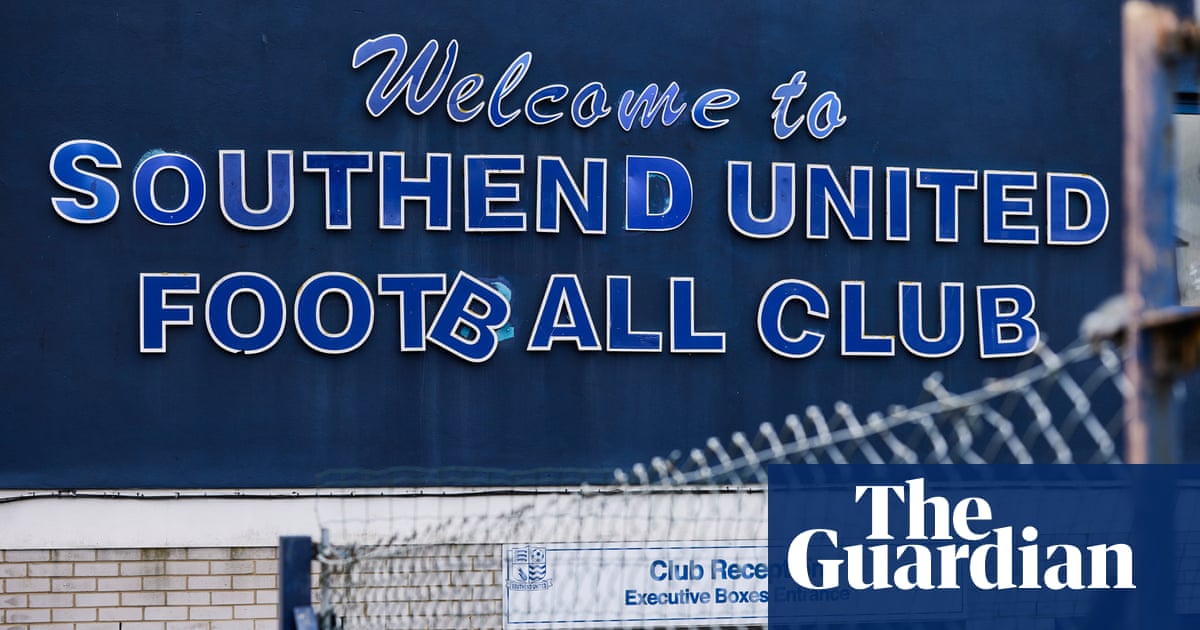
Peeling from a boarded-up building outside Roots Hall is an old poster. It shows a glimpse of a possible future, the image that of a grand white stadium with a sweeping concourse and fans chatting before the match. Underneath there is a line that reads “making Southend proud” and above, the slogan “Bring it on!” Once perhaps an exclamation of joy, it now reads like desperation.
On Wednesday Southend United face a winding-up petition in the high court, the result of unpaid taxes to HM Revenue & Customs. It marks the 18th such petition in the 25 years that the chairman, Ron Martin, has owned the club and it is hardly their only problem. Staff have gone unpaid, fans have lent money that remains unreturned, the club is up for sale and in 2021 the Shrimpers were relegated from the Football League for the first time in 100 years. They remain in the fifth tier.
“Previous experience suggests there will likely be enough evidence submitted for an adjournment of the petition,” says Robert Craven of the Shrimpers Trust, who has experienced more of these moments than likely is healthy. “But it’s also easy to be blase and personally I am quite fearful. There’s only so long you can keep treating people like Ron Martin does.”
Southend are hardly the only English football club facing uncertainty, Wigan and Charlton being just two more prominent examples. On the surface, Southend’s story is also a familiar one. An owner who bought the club and made grand promises of a new stadium, with an equally aspirational training ground alongside. It was a package that would take the Shrimpers to the next level, it was argued, but decades later it has yet to arrive. Now, for the owner, the costs of running a club appear to have outweighed its benefits.
“I think the fact that Ron Martin has put the club up for sale means he has recognised that we need to move on,” says Martin Terry, an independent councillor in the newly minted city of Southend-on-Sea, and season-ticket holder at Roots Hall. “We now need to find someone who wants to grow the club and who has the resources to do so. Like a lot of businesses in the country, there’s a cash flow problem. The fundamentals of the business are correct but we need someone to come in and resource it properly.”
Southend did not respond to requests for an interview with Martin, nor answer questions submitted by the Guardian. Being blanked is also the current experience of the Southend Echo, which has doggedly pursued the plight of the club over the past few years. Craven describes the club’s recent fall, from League One to non-league in two years, as a “precipitous decline”. Martin’s history of making payment at the last minute – whether to the taxman or staff – is unpleasant. But neither Craven nor Terry is willing to entirely put the boot into Southend’s owner.
“I’ve had moments at Roots Hall that were so exciting I can’t properly describe them,” Terry says. “The night we beat Manchester United here with Freddy Eastwood’s free-kick [in 2006], the entire nation was supporting us. Southend has a 100% record against Manchester United and that sort of thing gives the city something to think and dream about. Over the years we’ve had many glory days like that. It hasn’t all been bad, and some people have a short memory about it.”
Terry also argues there have been a number of occasions where the new stadium project was about to achieve liftoff, only to be hit by last-minute problems – including the global financial crisis of 2008 and charges of tax fraud which were brought against Martin by HMRC in 2021 but were later dismissed. “I respect Ron Martin, but the reality is that he needs to let go and let someone else in,” Terry says.
For Craven, there is a “complicated” relationship between owner and fans. “In 25 years we’ve had good times,” he says. “We had a season in the Championship and won the League One title [in 2006], one of only two championships in our history. But now for whatever reason if feels like he doesn’t have either the means or the inclination to run a football club. Some people would say he’s a villain, but I have concern over who the next owner might be.”
There are fans who have no truck at all with Martin, however, and they like to call him “Teflon Ron”. As the name suggests, they feel he should bear more responsibility for the club’s failings. “Nothing sticks with him,” says a representative of the recently formed Southend Fan Protest Group. “He’s really good at making out like he’s a nice guy and every time something comes up he manages to wriggle his way out of it, but we don’t think even he is sure he’s got the money to bridge the finances this time.”
The SFPG is largely comprised of younger fans and they take a direct approach to protesting against Martin’s ownership. They have led marches through the high street before matches and, last weekend, were picketing outside Martin’s house. “The original assumption was that we were just Stone Island-wearing, Kopparberg-drinking teenagers throwing abuse at Ron Martin,” the SFPG says, “And, yes, there was a bit of that. But we are on a hearts and minds campaign now; we want to raise awareness.”
The factions of the fanbase may differ in their assessment of the club’s plight, as might their response to it, but there is alignment too. They all insist upon the importance of the club to the broader community, and all would like Southend to come under some kind of fan control.
The SPFG says the trials of Southend United create an “air of depression and exhaustion” in the city, where “now, more than ever” football is a part of people’s identity. For Terry, the club can be a rallying point for a community split between commuters from London and those in traditional seasonal work along the Essex coast. He, like Craven, also sees opportunities for the city in terms of tourism should the club become upwardly mobile.
All have followed the debate around the government white paper into football governance and the possibility of a regulator that would enshrine some fan involvement in the running of the clubs they belong to. Terry says he is in favour of a German model of majority supporter ownership, while the SPFG is radical enough to be ready to see the club go into administration if it meant fan ownership at the end of it. Craven and the Shrimpers Trust, meanwhile, may be mocked by the SPFG as having effectively become Martin’s volunteer workforce, but are also acknowledged as having been effective in their work. “It just shows that fans could run the club,” the SFPG says.
Despite the travails, Southend finished just outside the National League playoffs in a year dominated by the heavyweights of Wrexham and Notts County. Disaster is not a given. Should a solution to the question of Martin’s ownership be found, it is also clear there are people ready to step in with ideas and energy. They all hope they have caught the scent of change on the sea air.












